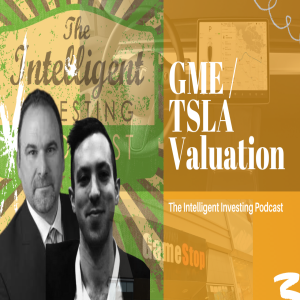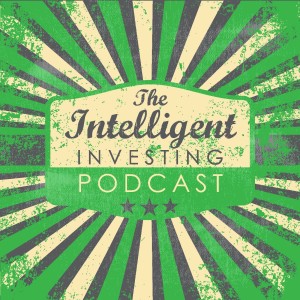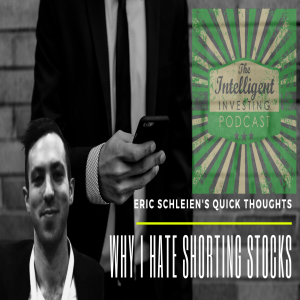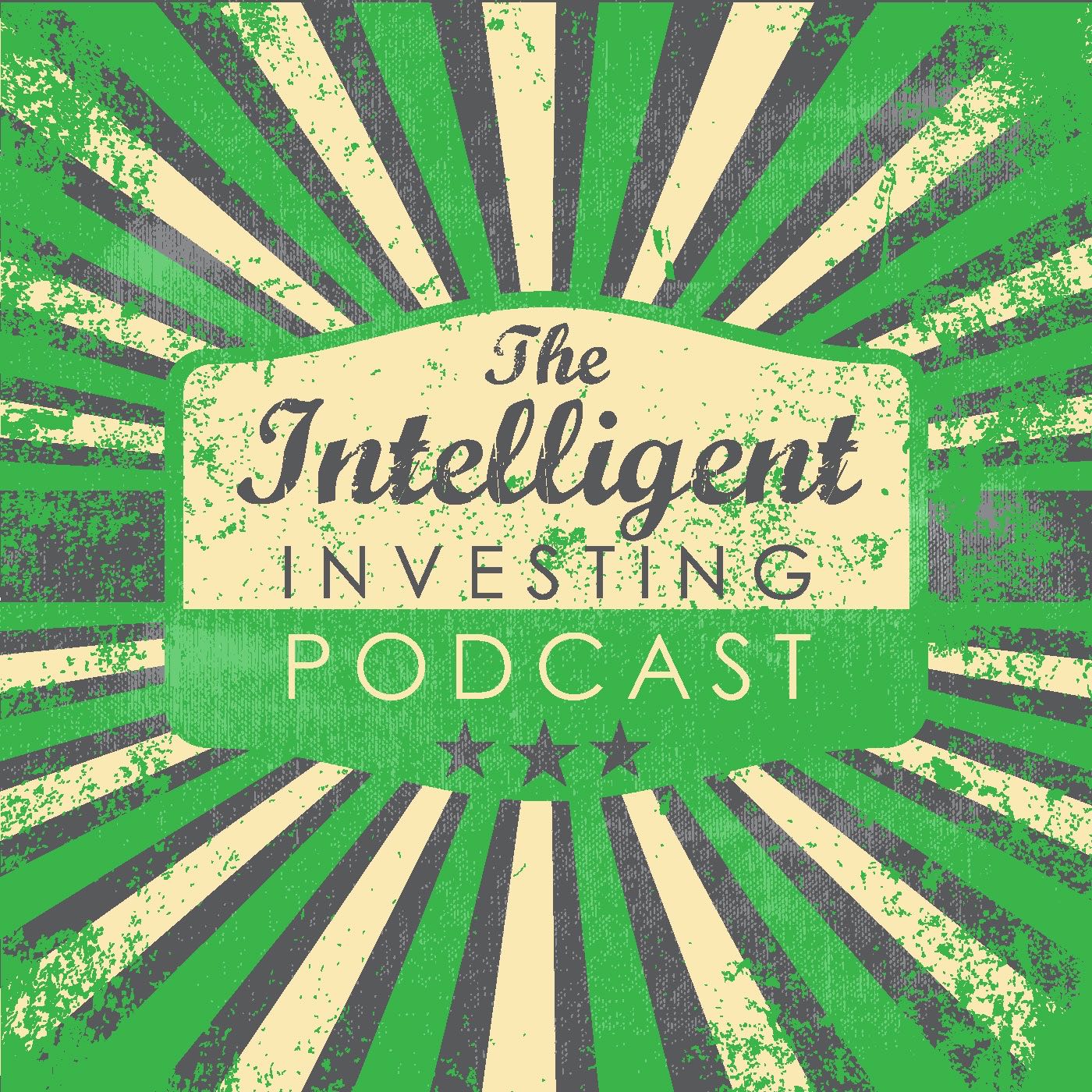Episodes

Thursday Feb 11, 2021
Thursday Feb 11, 2021
Resources
- For listeners interested in some of the research presented on the show today, you can sign up for the monthly newsletter, The Valuation Edge.
- For listeners interested in actually modeling companies they can join the waiting list for the Intrinsic Value Tool.
-
Value Investing 2nd Edition, on Amazon.
- Eric Schleien's Book: Principles Of Power: The Art & Wisdom of Badassery, on Amazon
About Eric Schleien
Over the past decade, Eric has trained thousands of individuals including board members of public companies as well as several Fortune 500 CEOs. Eric specializes in organizational culture and has become a leading authority on organizational culture in the investment industry.
Eric has been investing for 15 years and has been using breakthrough coaching methodologies for over a decade. Eric had the insight to combine proven coaching methodologies with shareholder activism techniques to create an entirely new model for shareholder activism that was more reliable and created greater sustainable results in a rapid period of time. On average, Tribal Leadership produces a 3-5x increase in profits of culturally troubled companies within an average of 24 months or less.
Eric currently resides in Philadelphia, PA.
Help Out The Podcast
If you like The Intelligent Investing Podcast, please consider leaving a rating and review on Apple Podcasts. It takes less than 30 seconds to do and makes a huge difference! You can also join the Facebook page!
You can subscribe to the podcast on the following platforms:
CONTACT ERIC SCHLEIEN

Friday Feb 05, 2021
Friday Feb 05, 2021
Welcome to the Intelligent Investing Quick Thoughts Series, where I just spend a few minutes on relevant topics, thoughts, or things in the news. Episodes are all under 10 minutes.
You can also watch the conversation on YouTube by clicking here.
Summary
In this episode, Eric Schleien discusses how to play GameStop (GME) from a value investing standpoint and what he is doing around selling Put Options.
Other episodes discussing GameStop (GME)
About Eric Schleien
Over the past decade, Eric has trained thousands of individuals including board members of public companies as well as several Fortune 500 CEOs. Eric specializes in organizational culture and has become a leading authority on organizational culture in the investment industry.
Eric has been investing for 15 years and has been using breakthrough coaching methodologies for over a decade. Eric had the insight to combine proven coaching methodologies with shareholder activism techniques to create an entirely new model for shareholder activism that was more reliable and created greater sustainable results in a rapid period of time. On average, Tribal Leadership produces a 3-5x increase in profits of culturally troubled companies within an average of 24 months or less.
Eric currently resides in Philadelphia, PA.
About Julian Lin
Julian is a contributor on Seeking Alpha with over 13,000 followers. Julian runs a stock investment newsletter named Best of Breed which invests in high-quality companies with “moaty” business models, conservative balance sheets, and best in class management teams. You can find out more about the newsletter here – there is a 2 week free trial available.
Help Out The Podcast
If you like The Intelligent Investing Podcast, please consider leaving a rating and review on Apple Podcasts. It takes less than 30 seconds to do and makes a huge difference! You can also join the Facebook page!
You can subscribe to the podcast on the following platforms:
CONTACT ERIC SCHLEIEN
Facebook | LinkedIn | Twitter | YouTube | GSCM | Instagram
Email: IntelligentInvesting@gmail.com

Thursday Feb 04, 2021
#135: Eric Schleien discussing selling GameStop (GME) Put Options
Thursday Feb 04, 2021
Thursday Feb 04, 2021
Welcome to the Intelligent Investing Quick Thoughts Series, where I just spend a few minutes on relevant topics, thoughts, or things in the news. Episodes are all under 10 minutes.
Summary
In this episode, Eric Schleien discusses how to play GameStop (GME) from a value investing standpoint and what he is doing around selling Put Options.
About Eric Schleien
Over the past decade, Eric has trained thousands of individuals including board members of public companies as well as several Fortune 500 CEOs. Eric specializes in organizational culture and has become a leading authority on organizational culture in the investment industry.
Eric has been investing for 15 years and has been using breakthrough coaching methodologies for over a decade. Eric had the insight to combine proven coaching methodologies with shareholder activism techniques to create an entirely new model for shareholder activism that was more reliable and created greater sustainable results in a rapid period of time. On average, Tribal Leadership produces a 3-5x increase in profits of culturally troubled companies within an average of 24 months or less.
Eric currently resides in Philadelphia, PA.
Help Out The Podcast
If you like The Intelligent Investing Podcast, please consider leaving a rating and review on Apple Podcasts. It takes less than 30 seconds to do and makes a huge difference! You can also join the Facebook page!
You can subscribe to the podcast on the following platforms:
CONTACT ERIC SCHLEIEN

Tuesday Jan 26, 2021
Tuesday Jan 26, 2021
I discuss why I hate shorting stocks and discuss the recent example of GameStop (GME).
About Eric Schleien
Over the past decade, Eric has trained thousands of individuals including board members of public companies as well as several Fortune 500 CEOs. Eric specializes in organizational culture and has become a leading authority on organizational culture in the investment industry.
Eric has been investing for 15 years and has been using breakthrough coaching methodologies for over a decade. Eric had the insight to combine proven coaching methodologies with shareholder activism techniques to create an entirely new model for shareholder activism that was more reliable and created greater sustainable results in a rapid period of time. On average, Tribal Leadership produces a 3-5x increase in profits of culturally troubled companies within an average of 24 months or less.
Eric currently resides in Philadelphia, PA.
Help Out The Podcast
If you like The Intelligent Investing Podcast, please consider leaving a rating and review on Apple Podcasts. It takes less than 30 seconds to do and makes a huge difference! You can also join the Facebook page!
You can subscribe to the podcast on the following platforms:
CONTACT ERIC SCHLEIEN

Monday Jan 25, 2021
Monday Jan 25, 2021
Welcome to the Intelligent Investing Quick Thoughts Series, where I just spend a few minutes on relevant topics, thoughts, or things in the news. Episodes are all under 10 minutes.
In this episode, I discuss some success I've had with overbid opportunities where you buy a stock that is getting bought out at an absurdly cheap price with the hope for a higher bid and where your downside is low due to the low valuation already. With a low-interest-rate environment, I expect these opportunities to continue to run into 2021.
About Eric Schleien
Over the past decade, Eric has trained thousands of individuals including board members of public companies as well as several Fortune 500 CEOs. Eric specializes in organizational culture and has become a leading authority on organizational culture in the investment industry.
Eric has been investing for 15 years and has been using breakthrough coaching methodologies for over a decade. Eric had the insight to combine proven coaching methodologies with shareholder activism techniques to create an entirely new model for shareholder activism that was more reliable and created greater sustainable results in a rapid period of time. On average, Tribal Leadership produces a 3-5x increase in profits of culturally troubled companies within an average of 24 months or less.
Eric currently resides in Philadelphia, PA.
Help Out The Podcast
If you like The Intelligent Investing Podcast, please consider leaving a rating and review on Apple Podcasts. It takes less than 30 seconds to do and makes a huge difference! You can also join the Facebook page!
You can subscribe to the podcast on the following platforms:
CONTACT ERIC SCHLEIEN

Thursday Jan 21, 2021
#132: Brian Balbirnie, Founder/CEO of Issuer Direct
Thursday Jan 21, 2021
Thursday Jan 21, 2021
Summary
In this episode, I sit down with Brian Balbirnie who is the Founder & CEO of one of my favorite microcap companies, Issuer Direct.
For those interested, a few years ago, I sat down with Travis Wiedower where we discussed the company.
This episode is also available on YouTube.
About Eric Schleien
Over the past decade, Eric has trained thousands of individuals including board members of public companies as well as several Fortune 500 CEOs. Eric specializes in organizational culture and has become a leading authority on organizational culture in the investment industry.
Eric has been investing for 15 years and has been using breakthrough coaching methodologies for over a decade. Eric had the insight to combine proven coaching methodologies with shareholder activism techniques to create an entirely new model for shareholder activism that was more reliable and created greater sustainable results in a rapid period of time. On average, Tribal Leadership produces a 3-5x increase in profits of culturally troubled companies within an average of 24 months or less.
Eric currently resides in Philadelphia, PA.
Help Out The Podcast
If you like The Intelligent Investing Podcast, please consider leaving a rating and review on Apple Podcasts. It takes less than 30 seconds to do and makes a huge difference! You can also join the Facebook page!
You can subscribe to the podcast on the following platforms:
CONTACT ERIC SCHLEIEN

Wednesday Jan 13, 2021
Wednesday Jan 13, 2021
Summary
In this episode, I bring Jeremy Raper of Raper Capital back on the show to discuss his 2021 Investment Playbook. We also do a recap of some of the investments from 2020.
You can also watch this episode on YouTube.
Show Notes
0:37 - Corona Update
1:34 - The easy money has been made, so now what?
2:46 - Market crises
4:51 - Short-term pain
5:59 - 2021 Investing Playbook
10:47 - Stonex Group (SNEX)
12:14 - Junior Canadian Copper Miners
14:27 - SPAC Warrant Arbitrage
15:57 - Hyliion Holdings Corp (HYLN)
16:06 - Nikola (NKLA) Warrant Spread
18:01 - Robinhood Punters
18:46 - TikTok Investors
24:32 - The Oil & Gas Industry
28:46 - Peabody Energy (BTU) Bonds
29:57 - Canadian Smallcaps
30:19 - Looking outside the United States
31:10 - Betterware de Mexico SAB de CV (BWMX)
43:52 - Martin Werner
About Eric Schleien
Over the past decade, Eric has trained thousands of individuals including board members of public companies as well as several Fortune 500 CEOs. Eric specializes in organizational culture and has become a leading authority on organizational culture in the investment industry.
Eric has been investing for 15 years and has been using breakthrough coaching methodologies for over a decade. Eric had the insight to combine proven coaching methodologies with shareholder activism techniques to create an entirely new model for shareholder activism that was more reliable and created greater sustainable results in a rapid period of time. On average, Tribal Leadership produces a 3-5x increase in profits of culturally troubled companies within an average of 24 months or less.
Eric currently resides in Philadelphia, PA.
Help Out The Podcast
If you like The Intelligent Investing Podcast, please consider leaving a rating and review on Apple Podcasts. It takes less than 30 seconds to do and makes a huge difference! You can also join the Facebook page!
You can subscribe to the podcast on the following platforms:
CONTACT ERIC SCHLEIEN
Facebook | LinkedIn | Twitter | YouTube | GSCM | Instagram
Email: IntelligentInvesting@gmail.com

Monday Jan 11, 2021
Monday Jan 11, 2021
Summary
In this episode of the Intelligent Investing Podcast, I sit down with the Founder & CEO of Shift (SFT) which went public recently via a SPAC.
Show Notes
1:29: Background On George Arison
3:50: Getting into the automotive space
4:39: The Auto Financing Market
10:16: Starting Shift
13:49: Company Growth
15:16: Disruption in Cars
16:20: The Traditional Dealer
16:26: Carvana vs Shift
18:49: Older cars are a huge part of the used car market
19:10: "How do you look at internal rate of returns?"
19:26: "it's a kind of a land grab situation"
20:31: "what the business looks like at scale"
27:02: "select dealers that we want to work with that have really high-quality inventory, high-quality service."
27:15: "a win for the dealership."
30:21: "how do you fund the growth right now?"
31:44: SPAC investing
33:16: "SPAC investors might actually get really burned if they're just buying a bunch of things that seem very sexy."
33:51: "There's been many, many, like over a hundred SPACs. I don't know how they're going to find deals."
34:53: "what investors should be looking for when they look at SPACs"
About Eric Schleien
Over the past decade, Eric has trained thousands of individuals including board members of public companies as well as several Fortune 500 CEOs. Eric specializes in organizational culture and has become a leading authority on organizational culture in the investment industry.
Eric has been investing for 15 years and has been using breakthrough coaching methodologies for over a decade. Eric had the insight to combine proven coaching methodologies with shareholder activism techniques to create an entirely new model for shareholder activism that was more reliable and created greater sustainable results in a rapid period of time. On average, Tribal Leadership produces a 3-5x increase in profits of culturally troubled companies within an average of 24 months or less.
Eric currently resides in Philadelphia, PA.
Help Out The Podcast
If you like The Intelligent Investing Podcast, please consider leaving a rating and review on Apple Podcasts. It takes less than 30 seconds to do and makes a huge difference! You can also join the Facebook page!
You can subscribe to the podcast on the following platforms:
CONTACT ERIC SCHLEIEN

Tuesday Dec 15, 2020
Tuesday Dec 15, 2020
Summary
In this episode, I had the pleasure of sitting down with Rafael Resendes who is the portfolio manager & co-founder of Applied Finance Capital Management.
It was pretty exciting to have the co-founder of Applied Finance on the Intelligent Investing Podcast due to the fact they have become a thought leader in valuation and portfolio construction in the value investing community. You could say they are the real deal. Unlike the majority of firms today that focus on low multiples to define “value”, they define value as identifying companies trading below their intrinsic value. Their Valuation Driven™ approach forms the foundation of their investment decisions.
Applied Finance is 100% employee-owned, with the average tenure of our 10 partners being over 18 years.
History of Innovation
Research has always been a critical part of Applied Finance’s culture. In 1995, they humbly began in a Chicago basement, with the idea to create a better approach to measuring corporate performance and value companies than existed at the time.
Their roots were and remain dedicated to answering two questions critical to any investment decision:
- What is a firm’s economic performance?
- What is a firm worth?
They developed the Economic Margin® framework to measure a firm’s economic, rather than as-reported accounting performance, leading the industry with primary research into:
- Capitalizing R&D
- Estimating size and leverage risk premium
- Modeling competitive advantage through Economic Profit Horizon™
Ultimately, creating a direct link from corporate performance to valuation.
Shortly thereafter, they began assembling a technical team that today includes a unique mix of professionals with diverse functional, educational, and cultural backgrounds. The result is a special workplace that values: accomplishment, stability, and ethics in the pursuit of excellence for our clients.
Since 1995, they have calculated over 20 million out of sample, point-in-time, company valuations. Each week they add approximately 20,000 additional intrinsic value estimates to continually expand their knowledge and improve their strategies.
Their proprietary research analytics provide the foundation for our repeatable and sustainable investment process.
Philosophy
His firm aims to buy stocks trading below their intrinsic value which forms the foundation of their strategies.
As obvious as that phrase seems, he believes there is much to appreciate in its meaning and implementation that is too often is either ignored and/or misunderstood in the value investment community.
First, he focuses his efforts on understanding a firm’s intrinsic value, not its cheapness. Cheapness investing, encompassing the Fama/French value factor among other low price to something metrics, has become extraordinarily popular over the past 30 years. While there has been an abundance of academic research and marketing expenditures promoting such styles, the research and messaging behind this approach is fundamentally flawed. After controlling for whether a stock is over or undervalued as measured by Applied Finance’s Intrinsic Value Factor, cheapness provides little to no achievable excess returns. The “low price to something” investment managers know such metrics do not represent intrinsic value, instead, they hope the stocks they buy are correlated to companies trading below their intrinsic value. Each week, Applied Finance calculates the intrinsic value of every stock in the investable universe of each strategy they support to determine the stocks providing the most attractive future expected returns at any point in time to identify candidates for inclusion into our strategies.
Second, his company actively cultivates a vibrant valuation culture within their investment group through an ongoing commitment to:
- Develop and maintain a deep professional expertise
- Perform ongoing theoretical and applied valuation research
- Continually review our valuation efficacy.
Lastly, while it is easy for an investment manager to claim they perform valuations as part of their research process, it is important to understand that performing a valuation is actually very easy, it is only simple algebra. In contrast, it is extraordinarily difficult to consistently perform valuations that identify companies trading above and below their intrinsic value, which can be purchased or sold short to generate alpha at the portfolio level.
Unlike any other firm, Applied Finance over the past 25 years has developed and maintained original, proprietary research to properly model equity risk premiums and Economic Margin® sustainability, which they call Economic Profit Horizon™. This enables them to avoid the unrealistic assumptions common to most valuation approaches practiced today.
In addition, they archive 20,000 valuations weekly, over 20 million since 1995, that allow them to understand how well they value the stocks they own in their portfolios and just as importantly those they do not so they continually learn and grow our knowledge base from our mistakes.
This enables them to avoid the unrealistic assumptions common to most valuation approaches practiced today.
About Eric Schleien
Over the past decade, Eric has trained thousands of individuals including board members of public companies as well as several Fortune 500 CEOs. Eric specializes in organizational culture and has become a leading authority on organizational culture in the investment industry.
Eric has been investing for 15 years and has been using breakthrough coaching methodologies for over a decade. Eric had the insight to combine proven coaching methodologies with shareholder activism techniques to create an entirely new model for shareholder activism that was more reliable and created greater sustainable results in a rapid period of time. On average, Tribal Leadership produces a 3-5x increase in profits of culturally troubled companies within an average of 24 months or less.
Eric currently resides in Philadelphia, PA.
Help Out The Podcast
If you like The Intelligent Investing Podcast, please consider leaving a rating and review on Apple Podcasts. It takes less than 30 seconds to do and makes a huge difference! You can also join the Facebook page!
You can subscribe to the podcast on the following platforms:
CONTACT ERIC SCHLEIEN

Thursday Dec 10, 2020
#128: Jason DeBono
Thursday Dec 10, 2020
Thursday Dec 10, 2020
Summary
Jason DeBono, corporate Vice President of NuView Trust Company. Jason shares the ins and outs of alternative investing and also offers current investors a deep dive into their world and share with them how they can use their current retirement plans and turn them into funds for alternative investments.
With over 15 years of experience in the self-directed IRA industry, and his role as Vice President of NuView Trust Company – Jason & his team are on a mission to empower people by providing them with valuable information on how to move away from ever-unpredictable wall street stocks and bonds and into more sustainable, “main street” investments. A self-directed custodian with over $1.4 billion of assets under custody, NuView specializes in enabling individual investors and financial professionals to diversify their investment portfolios, using alternative asset classes such as real estate, tax liens and deeds, notes, private equity, cryptocurrency, and precious metals in IRAs. Outside of his role at NuView, Jason is the loving father of 2 children and serves as Co-founder and Chairman of Chair the Love, a 501(c)(3) organization, which provides wheelchairs and other mobility-related services to those in need.
A recording of this podcast on YouTube can be found, here.
About Eric Schleien
Over the past decade, Eric has trained thousands of individuals including board members of public companies as well as several Fortune 500 CEOs. Eric specializes in organizational culture and has become a leading authority on organizational culture in the investment industry.
Eric has been investing for 15 years and has been using breakthrough coaching methodologies for over a decade. Eric had the insight to combine proven coaching methodologies with shareholder activism techniques to create an entirely new model for shareholder activism that was more reliable and created greater sustainable results in a rapid period of time. On average, Tribal Leadership produces a 3-5x increase in profits of culturally troubled companies within an average of 24 months or less.
Eric currently resides in Philadelphia, PA.
Help Out The Podcast
If you like The Intelligent Investing Podcast, please consider leaving a rating and review on Apple Podcasts. It takes less than 30 seconds to do and makes a huge difference! You can also join the Facebook page!
You can subscribe to the podcast on the following platforms:

